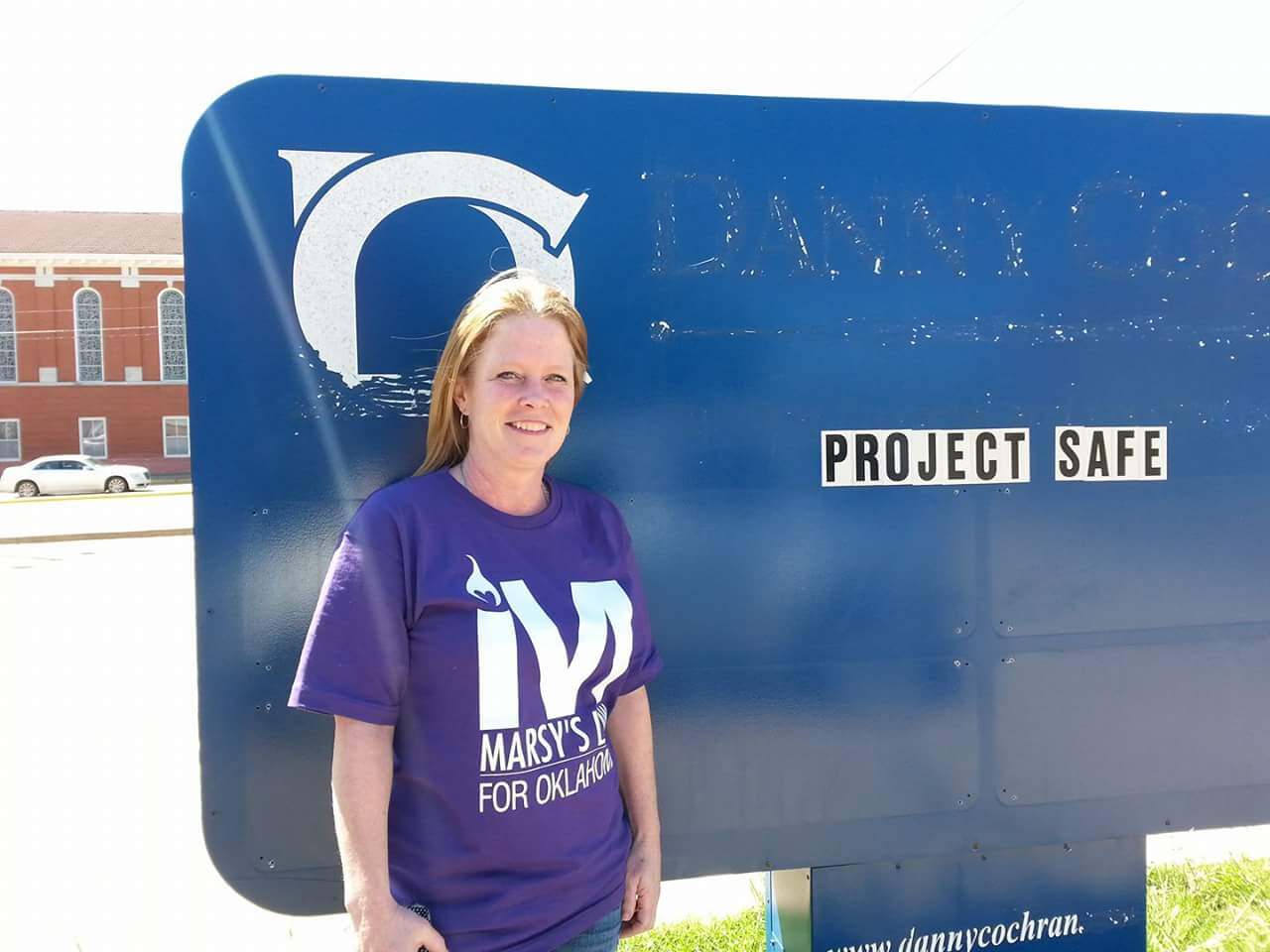Marsy's Law for Oklahoma
On November 6, 2018, voters in Oklahoma passed Marsy’s Law overwhelmingly with 78% of the vote!
Get Updates
What is Marsy’s Law?
Marsy’s Law is a national movement that aims to ensure victims of crime have meaningful and enforceable constitutional rights in the criminal justice system. Oklahoma voters overwhelmingly voted to pass Marsy’s Law on Nov. 6, 2018, in the form of a ballot initiative numbered State Question 794. As a result, today the Oklahoma Constitution guarantees greater protections for victims, survivors, and their families or guardians.
Supporters' Stories
These are some of the Oklahomans who fought to pass Marsy’s Law.
Leesa Sparks wants to change a system that neglected her
Leesa Sparks wants to change a system that neglected her
Learn More
Leesa Sparks wants to change a system that neglected her
Leesa Sparks wants to change a system that neglected her
Learn More
Virginia Lewis wants to balance the scales of justice
Virginia Lewis wants to balance the scales of justice
Learn More
FAQs
-
What is Marsy's Law?
Marsy’s Law is a national movement that aims to ensure victims of crime have meaningful and enforceable constitutional rights in the criminal justice system. Marsy’s Law was inspired by Marsalee (Marsy) Nicholas, a University of California Santa Barbara student, who was stalked and killed by her ex-boyfriend in 1983. Just one week after her murder, Marsy’s mother was confronted by her daughter's killer at the grocery store. The family was never notified that her killer had been released.
Marsy’s Law proposes a series of protections for victims of crime to ensure they are informed of their rights, notified of developments and proceedings in their case, heard throughout the process, and treated with the respect and dignity they deserve.
Oklahoma voters overwhelmingly voted to pass Marsy’s Law on Nov. 6, 2018, in the form of a ballot initiative numbered State Question 794. As a result, today the Oklahoma Constitution guarantees greater protections for victims, survivors, and their families or guardians.
-
What specific rights does Marsy’s Law in Oklahoma ensure victims of crime?
The passage of Marsy’s Law/SQ 794 added the following rights for victims to the Oklahoma Constitution:
- The right to be treated with fairness and respect for the victim's safety, dignity and privacy;
- The right, upon request, to be provided with reasonable and timely notice of and to be present at all proceedings involving the criminal or delinquent conduct;
- The right to be heard in any proceeding involving release, plea, sentencing, disposition, parole and any proceeding during which a right of the victim is implicated;
- The right to reasonable protection; upon request,
- The right to reasonable notice of any release or escape of an accused;
- The right to refuse an interview or other request made by the accused or any person acting on behalf of the accused, unless subpoenaed by defense counsel
- The right to full and timely restitution;
- The right to proceedings free from unreasonable delay and a prompt conclusion of the case;
- The right, upon request, to confer with the attorney for the state;
- The right to be informed of all rights enumerated above.
Furthermore, the Constitution gives victims the right to seek enforcement of those rights before a court if they believe their rights have been violated.
-
When did Marsy’s Law go into effect?
Marsy’s Law went into effect immediately upon SQ 794’s passage on November 6, 2018. The state of Oklahoma is responsible for upholding all the rights listed above.
However, SQ 794 did not detail how the state of Oklahoma was to enforce or implement each right, nor did it update statute to mirror the new constitutional rights outlined in SQ 794. That was done through additional legislation, HB 1102, which goes into effect on November 1, 2019.
For instance, SQ 794 states that every crime victim must be informed of their rights. HB 1102 statutorily mandates how the constitutional right will be carried out, for example: that crime victims must be informed of their rights in writing, by a law enforcement agent responding to the report of a crime.
-
Where can I see a comprehensive set of victims’ rights posted by the state of Oklahoma?
The Office of the Attorney General is required to post a comprehensive set of victims’ rights to its website at oag.ok.gov no later than November 1, 2019.
-
Who is responsible for notifying a victim of his or her rights when a crime is reported?
While SQ 794 does not state how a victim must be notified of their rights, HB 1102 (effective Nov. 1, 2019) specifies that a law enforcement officer responding to a crime must first notify a victim of their rights. Once the office of the local district attorney chooses to prosecute an alleged criminal, the victim is again notified of their rights by that district attorney’s office.
HB 1102 states: Upon initial contact with a victim, a municipal, county or state law enforcement officer shall provide the victim with a written copy of the constitutional and statutory rights of the victim unless, in the judgment of the law enforcement officer making the initial contact, the circumstances of the criminal offense or delinquent act and condition of the victim indicates that the victim, family of the victim or dependents of the victim will not be able to understand the significance of the constitutional and statutory rights. If a written copy of the constitutional and statutory rights is not provided upon initial contact with the victim, a written copy of the rights shall be provided on the next contact with the victim by a law enforcement officer with the same law enforcement agency no later than twenty-four (24) hours after the initial contact.
… The office of the district attorney's office attorney shall inform victims of violent crimes and members of the immediate family of such victims of their rights under Sections 142A-8 and 142A-9 of this title and Section 332.2 of Title 57 of the Oklahoma Statutes.
-
As a victim, what are my options for restitution and/or financial assistance?
Victims have the right to have stolen property returned, and victims of violent crime may apply for compensation through the Oklahoma Crime Victims Compensation Program (ok.gov/dac/Victims/Victims_Compensation_Program/). More services and information for victims are available at oag.ok.gov/victim-services.
HB 1102 (in effect Nov. 1, 2019) and Oklahoma law state that victims have the right:
- To be informed of financial assistance and other social services available as a result of being a witness or a victim, including information on how to apply for the assistance and services;
- To be informed of the procedure to be followed in order to apply for and receive any witness fee to which the victim or witness s entitled;
- To be informed of the procedure to be followed in order to apply for and receive any restitution to which the victim is entitled;
- To have any stolen or other personal property expeditiously returned by law enforcement agencies when no longer needed as evidence. If feasible, all such property, except weapons, currency, contraband, property subject to evidentiary analysis and property the ownership of which is disputed, shall be returned to the person;
- To be provided with appropriate employer intercession services to ensure that employers of victims and witnesses will cooperate with the criminal justice process in order to minimize the loss of pay and other benefits of the employee resulting from court appearances;
- To have the family members of all homicide victims afforded all of the services under this section, whe
-
What other resources are available to victims of crime?
Depending on the nature of the crime, victims may find assistance from the following services and organizations:
- The Attorney General’s office offers services related to address confidentiality, death penalty cases, Oklahoma VINE criminal tracking and victim notification system, and other resources for victims. More at http://www.oag.ok.gov/victim-services-citizen-resources?__m=1
- The District Attorneys Council administers a variety of victim support programs including the Crime Victims Compensation Fund. More at: https://www.ok.gov/dac/Victims/index.html
- The YWCA of Oklahoma City provides help and hope to victims of violence, sexual assault and stalking. More at: https://www.ywcaokc.org/
- The Oklahoma Homicide Survivors Group offers support to Oklahomans who have lost loved ones to acts of violence. More at: https://ohssg.com/
- Mothers Against Drunk Driving offers help to those impacted by drunk or drugged driving. More at: https://www.madd.org/oklahoma/
-
If a victim or their family feels their rights have been violated, what steps can they take?
A victim or his or her attorney may assert to any court or entity with authority over their case that their rights have been violated.
Furthermore, we encourage victims who feel their rights have been violated to reach out to us at https://www.marsyslaw4ok.com/share_your_story.
Latest News
Stay up-to-date on the latest news about Marsy's Law and victims' rights in Oklahoma
1 min read
Pressing on Through a Challenging Year
Dec 30, 2021
1 min read
The Year Ahead: 2021
Feb 8, 2021
